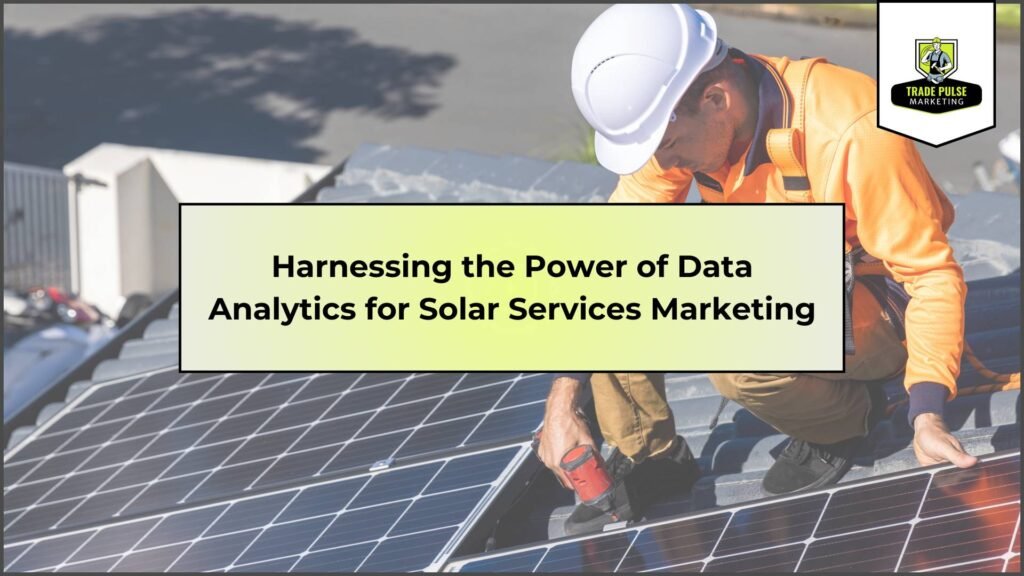Welcome to the exciting world of data analytics in solar services marketing! As the solar industry grows, understanding how to analyze data can give you a competitive edge. By examining customer behavior, market trends, and campaign performance, businesses can make informed decisions that drive better results. This approach not only helps you improve your marketing strategies but also ensures you connect with potential customers effectively. Think of data analytics as your guide, helping you navigate the solar landscape with confidence. Whether you’re looking to enhance customer engagement or optimize your marketing campaigns, leveraging data insights can make a significant difference. Join us as we explore how data-driven strategies can shine a light on your solar marketing efforts.
Importance of Data-Driven Decisions in Solar Services Marketing
In today’s competitive solar services market, making decisions backed by data is crucial. When you analyze customer preferences and market trends, you can tailor your marketing strategies to meet the needs of your audience. This approach not only boosts engagement but also builds trust with potential customers.
Using data analytics allows you to identify which campaigns work best, helping you allocate your resources effectively. You can understand the local solar market better, ensuring you connect with homeowners looking for sustainable energy solutions.
Moreover, a data-driven strategy can enhance your brand’s credibility by showcasing your expertise and understanding of solar energy. By focusing on data, you make smarter choices that benefit both your company and your customers, leading to a brighter, more sustainable future.
Key Metrics to Track for Solar Services Marketing
When marketing solar services, tracking key metrics helps you understand your impact and refine your strategy. Start with customer acquisition cost (CAC)—this shows how much you spend to gain each new customer. Monitor conversion rates to see how many website visitors become leads or customers. Engagement metrics, like click-through rates on emails or social media posts, reveal what content resonates most with your audience.
Don’t forget about customer lifetime value (CLV), which estimates how much revenue each customer generates over time. Keeping an eye on retention rates tells you how well you maintain customer relationships, crucial in a service-based industry. Lastly, measure referral rates to assess how likely your satisfied customers are to recommend you. By focusing on these metrics, you can fine-tune your marketing efforts, maximizing your outreach and building trust in your brand.
Tools and Techniques for Data Analysis in Solar Services Marketing
When diving into solar services marketing, leveraging the right tools and techniques for data analysis can make a significant difference. Start with customer relationship management (CRM) systems like HubSpot or Salesforce to track client interactions and insights. Utilize social media analytics tools such as Hootsuite or Buffer to gauge audience engagement and sentiment around solar energy.
Next, consider Google Analytics to monitor your website traffic and understand which content resonates most with your visitors. Surveys and feedback forms can also provide invaluable direct insights from your customers about their needs and preferences.
By analyzing this data, you can tailor your marketing strategies to target the right audience more effectively, optimizing your campaigns for success. This approach not only enhances customer satisfaction but also positions you as a trusted authority in the solar industry, ultimately driving more business your way.
Applying Insights from Data Analytics to Improve Solar Services Marketing
Are you looking to boost your solar services marketing? Data analytics can help you make smarter decisions. By analyzing customer preferences, you can tailor your campaigns to what potential clients truly value—like cost savings and environmental impact. Track engagement metrics to understand which channels generate the best leads.
Additionally, using geographic data helps you identify the areas with the highest demand for solar services. This way, you can target local communities effectively. Engaging content that educates your audience about solar benefits not only builds trust but also establishes your authority in the field.
Incorporate customer feedback into your strategy to create a service that resonates with your audience. By leveraging data analytics, you can enhance your marketing efforts and connect more effectively with those seeking solar solutions.
Conclusion on Harnessing the Power of Data Analytics for Solar Services Marketing
In today’s competitive landscape, harnessing data analytics is crucial for effectively marketing solar services. By understanding customer preferences and market trends, you can tailor your offerings to meet specific needs, ensuring higher engagement and conversion rates. Data analytics empowers you to optimize marketing campaigns, target the right audience, and measure success effectively. This not only boosts your brand’s visibility but also establishes you as a trusted authority in the solar industry.
If you’re looking to enhance your marketing strategy with professional guidance, consider scheduling a free strategy call with Trade Pulse Marketing. Together, we can develop a targeted plan that drives results and elevates your solar services.

